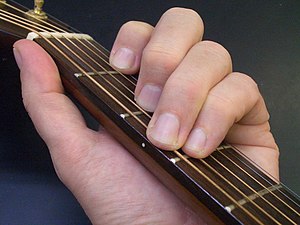Recently someone commented on one of my blogs that they would like to know how to write a song without an instrument. You would think that because there is music involved, it would be next to impossible to write a song without any musical “ability”. If you are overwhelmed with the idea of learning an instrument, the fact is that many of us assume that we are supposed to become some kind of virtuoso on it which, as a guitar teacher, I can tell you is not true! Most guitar teachers can tell you that.

- Image via Wikipedia
Even if we are not singers, we can all hum. And if you’ve been around music all of your life, as most of us have, you’ve probably found yourself humming along or singing along with your favourite songs. If you already have some lyrics written, free yourself from your musical inhibitions by “singing” them in some sort of way that gives you a feel for the meter (rhythm) of them. Don’t worry whether or not it is GOOD, just do it! See if you can’t find some kind of melody that matches the meter and then just keep experimenting. You might find that you “hear” certain melodies with certain lines and not with others. That could mean that you just haven’t found it yet, or it could mean that the lines with no melodies just aren’t working. So keep working at it, change the lines or mess around with another melody…just keep trying. The more you liberate yourself from feeling like you CAN’T do it, the less inhibited you will become.
If you are overwhelmed with the idea of learning an instrument, the fact is that many of us assume that we are supposed to become some kind of virtuoso on it which, as a guitar teacher, I can tell you is not true! Most people learn an adequate number of chords within a few weeks or months, for instance, to be able to play a good selection of songs that they like. The fact is that many songs are rather simple in their chord progressions (a chord progression is a series of chords), and so they can be learned fairly easily. So you can probably learn enough chords in a couple of months to start trying to match them to your lyrics.
Your other option is to find someone who CAN play, and who can help you find chords and melodies. This might take some doing, but then again, there could be someone in your own backyard or circle of friends who already plays and might be willing to experiment with your lyrics. You can either give the lyrics entirely up to them, or you can sit with them and try to come up with some ideas together.
A third option would be to invest in some kind of software like Band-In-A-Box which is a clever computer software program that you can create backing tracks (music) to your melodies or lyrics with little effort. You can play with chords without knowing which chords go together, and you can pick styles and instruments, again, without knowing much about them, and still come up with a decent sounding “band” to sing your songs along with.
I was at a songwriting retreat once where one of the participants in my little group didn’t play an instrument at all. Somehow she had found someone to come up with chords to her melodies, so when it was her turn to perform one of her songs, she just gave the chords to someone who could play guitar and she sang along with him. I admired her for her dedication to songwriting even though she had never learned an instrument. And you don’t have to be limited either!
Now I know that some of you out there reading this blog might have suggestions of your own, so if you do, please add them below! Comments and replies always welcome :-).
IJ

![Reblog this post [with Zemanta]](http://img.zemanta.com/reblog_e.png?x-id=d2cd1a24-42d4-4067-bfad-c7e98908cbe3)